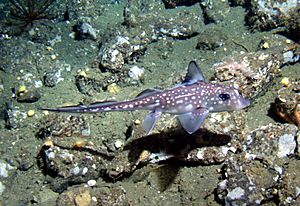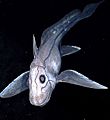Chimaera (fish) facts for kids
Quick facts for kids Chimaeras |
|
|---|---|
 |
|
| Hydrolagus colliei | |
| Scientific classification |
|
| Kingdom: | Animalia |
| Phylum: | Chordata |
| Class: | Chondrichthyes |
| Subclass: | Holocephali |
| Order: | Chimaeriformes Obruchev, 1953 |
| Families | |
|
Callorhinchidae |
|
Chimaeras are a special type of fish with skeletons made of cartilage, not bone. They belong to the group called Chimaeriformes. People sometimes call them 'ghost sharks' because they are related to sharks but look quite different.
Chimaeras are thought to be one of the oldest and most mysterious groups of fish alive today. Their closest living relatives are sharks. However, chimaeras separated from sharks in terms of evolution almost 400 million years ago! They have been on their own evolutionary path ever since.
Long ago, there were many different kinds of chimaeras. We know this from the fossils they left behind. Today, most chimaeras live deep in the ocean. There are about 50 living species, divided into six main types and three families. It has been hard for scientists to understand how these species evolved because there are not many good fossils. Now, scientists often use DNA to learn more about how different species developed.
The first chimaeras appeared about 420 million years ago during a time called the Silurian period. The three main families of chimaeras we see today started to become different from each other between 170 and 120 million years ago. This was during the late Jurassic and early Cretaceous periods.
What Makes Chimaeras Special?
Chimaeras do not have the rough skin or sharp teeth that sharks do. Instead, their bodies are covered in smooth scales. They have three pairs of flat, grinding tooth plates in their mouths. These plates help them crush their food.
One interesting feature is a poisonous spine located on their backs. This spine is found between their head and their dorsal fin (the fin on their back).
Like sharks, chimaeras have skeletons made of cartilage. This is the same flexible material found in your nose and ears. They use special organs called claspers for fertilization to reproduce. Female chimaeras lay eggs that are protected by tough, leathery cases. Chimaeras also have a special sense called electroreception. This means they can sense the tiny electrical fields made by other living things. This helps them find their prey in the dark depths of the ocean. This sense is also common in other fish like rays.
Images for kids
-
Deep-sea chimaera photographed by the NOAAS Okeanos Explorer. Visible on its snout are tiny pores which lead to electroreceptor cells.
See also
 In Spanish: Chimaeriformes para niños
In Spanish: Chimaeriformes para niños
 | Mary Eliza Mahoney |
 | Susie King Taylor |
 | Ida Gray |
 | Eliza Ann Grier |


